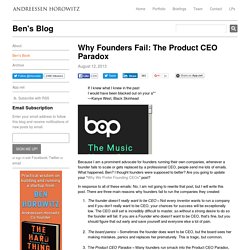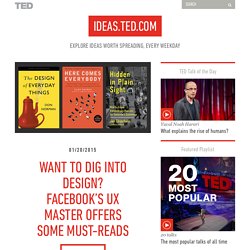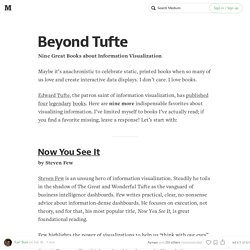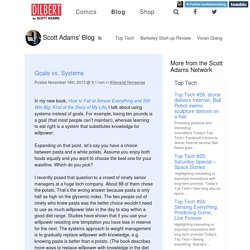

Why Founders Fail: The Product CEO Paradox. If I knew what I knew in the pastI would have been blacked out on your a**—Kanye West, Black Skinhead Because I am a prominent advocate for founders running their own companies, whenever a founder fails to scale or gets replaced by a professional CEO, people send me lots of emails.

What happened, Ben? I thought founders were supposed to better? Are you going to update your “Why We Prefer Founding CEOs” post? In response to all of these emails: No, I am not going to rewrite that post, but I will write this post. The founder doesn’t really want to be CEO – Not every inventor wants to run a company and if you don’t really want to be CEO, your chances for success will be exceptionally low. A friend of mine led his company from nothing to over $1 billion in revenue in record time by relentlessly pursuing his product vision.
This happens all the time. How can we prevent that? But how do you do that and only that if you have been involved in the product at a much deeper level the whole way? 4000 Essential English Words 3 by I.S.P. Nation. I Will Teach You To Be Rich. Amazon.fr - The Power of Now : A Guide to Spiritual Enlightenment - Eckhart Tolle - Livres. Amazon.fr - When Things Fall Apart: Heart Advice for Difficult Times - Pema Chödrön - Livres. The Places That Scare You: A Guide to Fearlessness in Difficult Times by Pema Chödrön. Business Model Generation - Book. The 4-Hour Body: An Uncommon Guide to Rapid Fat-Loss, Incredible Sex, and Becoming Superhuman: Timothy Ferriss: 8601401261797: Amazon.com: Books. The Five Minute Journal: A Happier You in 5 Minutes a Day: Alex Ikonn; UJ Ramdas: 9780991846207: Amazon.com: Books. Books for Founders - Building a startup is tough. These books might help, curated by industry veterans. by Product Hunt.
The Secret to Learning Anything: Albert Einstein’s Advice to His Son. Amazon. Want to dig into design? Facebook’s UX master offers some must-reads. As Facebook’s director of product design, Margaret Gould Stewart (TED Talk: How giant websites design for you (and a billion others, too)) has to come up with designs seen by literally billions of people.

No pressure. She’s an old hand at this game, though, having previously worked on the digital output of those other giants, Google and YouTube. So what principles of design does she live by, and how does she think about scaling them? Check out her must-read books and articles. Great reads on design 1. “Originally published in 1988, this is a longstanding classic in the field (25 years is a long time in technology!) 2.
“This slim but insightful volume delves deeply into the concept of simplicity, and applies that principle in a variety of contexts, including design, technology and more generally our day-to-day lives.” 3. “A great introduction to design for those interested in understanding the hows and the whys. 4. 5. Designing at a global scale 1. 2. Beyond Tufte. Semiology of Graphics by Jacques Bertin Make no mistake: this is the ur-book of information visualization.

Bertin’s masterpiece, published in 1967, outlines an systemic approach to the creation of information graphics as no other book has, before or since. In fact, Bertin provides a simple table that ties together math, music, and graphics, right on the second page of Semiology of Graphics: This table exemplifies Bertin’s approach to visualizing information: break a problem into its constituent elements, cross them, then examine and define each intersection.
After addressing fundamentals, Bertin dives into theory. Top Startup Books. / startupbooks.top [beta] UX Design Weekly User Experience Book Giveaway. Goals vs. Systems. Posted November 18th, 2013 @ 9:11am in #General Nonsense In my new book, How to Fail at Almost Everything and Still Win Big: Kind of the Story of My Life, I talk about using systems instead of goals.

For example, losing ten pounds is a goal (that most people can’t maintain), whereas learning to eat right is a system that substitutes knowledge for willpower. Expanding on that point, let’s say you have a choice between pasta and a white potato. Assume you enjoy both foods equally and you want to choose the best one for your waistline. Which do you pick? I recently posed that question to a crowd of ninety senior managers at a huge tech company. Here’s another example. Compare the goal of exercising 3-4 times a week with a system of being active every day at a level that feels good, while continuously learning about the best methods of exercise. The Only UX Reading List Ever.